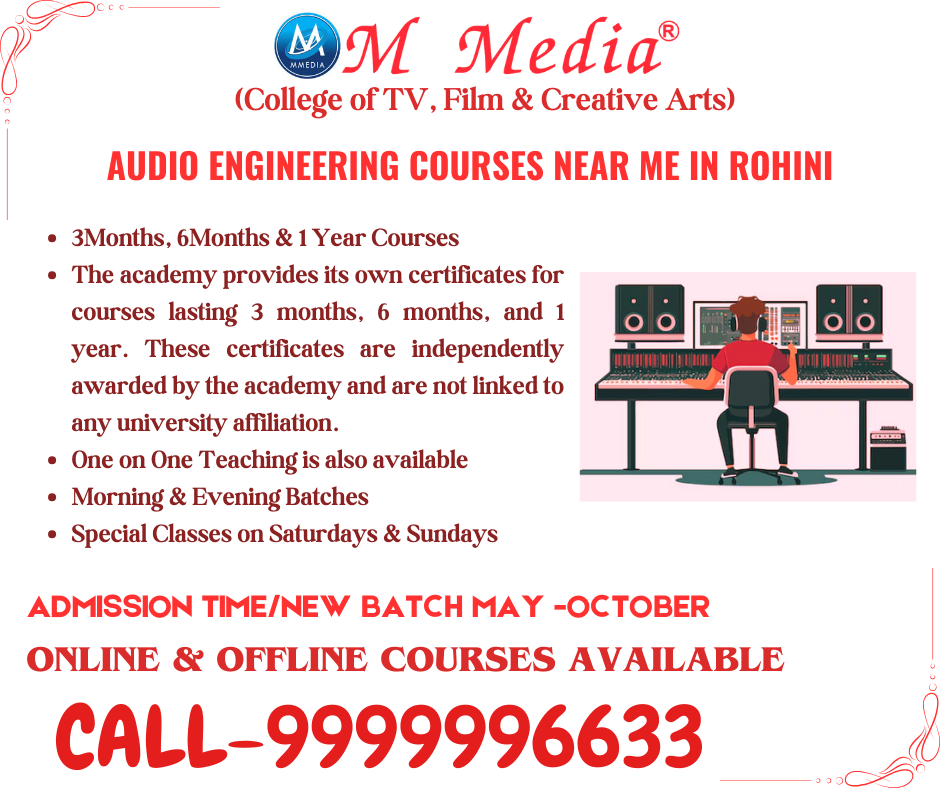
INTRODUCTION:
Audio Engineering Courses Near Me In Rohini are professional programs designed to train individuals in the art and science of sound production. These courses encompass a variety of topics, including sound recording, editing, mixing, mastering, and live sound management. Whether you aspire to work in music production, film post-production, radio broadcasting, or live event sound design, audio engineering courses provide a solid foundation for turning your passion into a rewarding career.
Audio Engineering Courses Near Me In Rohini combines creativity with technical expertise, allowing students to explore both the artistic and scientific aspects of sound. These courses are offered at various levels, from beginner to advanced, and can be pursued through online platforms, colleges, or specialised training institutions.c
IMPORTANCE:
1. Bridging the Gap Between Creativity and Technology
Audio engineering is a unique field that requires both creative vision and technical skills. Courses in audio engineering help students learn how to balance these two aspects, ensuring that they can create high-quality sound that meets industry standards. This blend of creativity and technology makes audio engineering a vital skill for modern media production.
2. Preparing for Industry Demands
The media and entertainment industries are highly competitive, and employers look for professionals with hands-on training and certifications. Audio engineering courses equip students with the knowledge and experience needed to stand out in the job market. These courses ensure that students are up-to-date with the latest trends, tools, and techniques in sound production.
3. Enhancing Technical Proficiency
Audio engineering involves working with sophisticated equipment and software, such as microphones, mixing consoles, and digital audio workstations (DAWs). Through these courses, students gain practical experience with industry-standard tools, building their technical proficiency and confidence in using them effectively.
4. Opening Doors to Multiple Career Paths
Audio engineering is a versatile field with applications in various industries, including music, film, television, gaming, and live events. By enrolling in audio engineering courses, students can explore different career paths and specialise in areas that align with their interests and strengths.
BENEFITS:
1. Hands-On Learning Experiences
Most audio engineering courses prioritise practical, hands-on learning. Students work with professional-grade equipment and software, gaining real-world experience in recording studios, live sound setups, and post-production environments. This practical training prepares them to handle challenges they may encounter in professional settings.
2. Access to Industry-Standard Tools and Software
Audio engineering courses provide access to cutting-edge tools and software, such as Pro Tools, Logic Pro, and Ableton Live. Learning how to use these tools during the course gives students a competitive edge when entering the workforce.
3. Building a Professional Portfolio
A strong portfolio is essential for anyone pursuing a career in audio engineering. Through course assignments and projects, students create a collection of their best work, showcasing their skills and creativity to potential employers or clients.
4. Learning from Industry Professionals
Many audio engineering courses are taught by experienced professionals who bring real-world insights to the classroom. These instructors not only teach technical skills but also share valuable advice about succeeding in the industry, from networking to navigating complex projects.
5. Networking Opportunities
Audio engineering courses often connect students with peers, instructors, and industry experts, providing invaluable networking opportunities. These connections can lead to internships, collaborations, and even job offers, helping students kickstart their careers.
6. Enhancing Creativity
While audio engineering is technical in nature, it also requires a high level of creativity. Students learn how to think outside the box, experimenting with sound effects, compositions, and mixing techniques to create unique audio experiences. These skills are particularly valuable for those interested in sound design or music production.
7. Boosting Job Prospects and Earning Potential
Employers in the audio industry value formal training and certifications. Completing an audio engineering course can significantly improve job prospects, leading to roles in recording studios, live event production, or post-production facilities. Additionally, skilled audio engineers often command higher salaries, making it a lucrative career choice.
8. Flexible Learning Options
With the rise of online education, audio engineering courses have become more accessible than ever. Students can choose from in-person classes, online programs, or hybrid options, allowing them to learn at their own pace and convenience.


